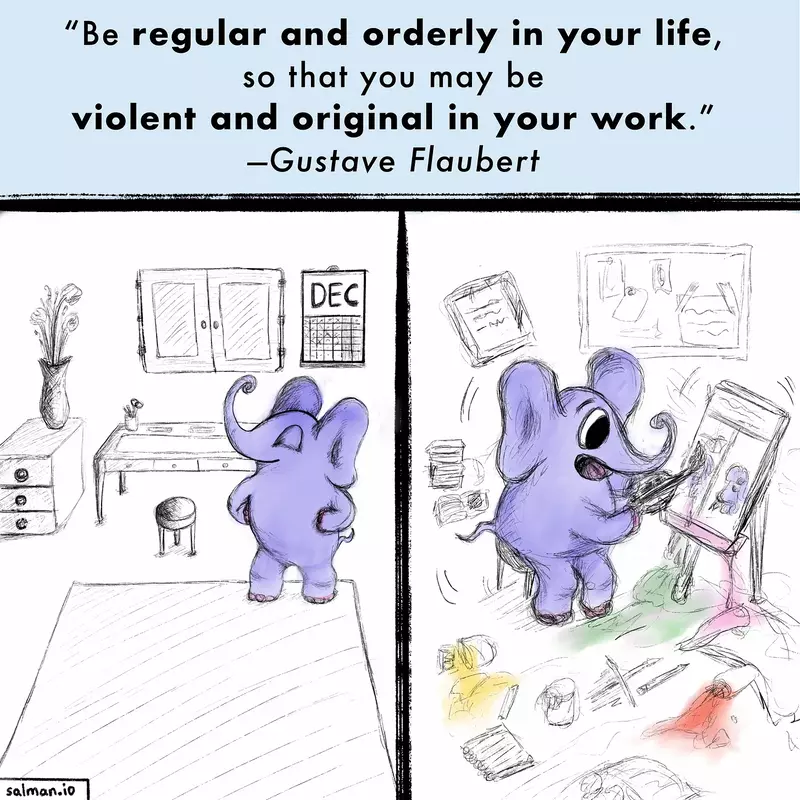Rewards of Routine
When I left my full-time job to pursue a life of creative independence, the thing I valued most was my freedom. I wanted to stay loose with my schedule and embrace serendipity. The unpredictability of each day was a welcome break from years of rigid work-enforced schedules.
But, to my surprise, I discovered that too much freedom is draining. The burden of having to choose each and every activity quickly weighs me down. I easily become overwhelmed with decision fatigue, and too drained to do anything at all.
I’ve come to appreciate the value of simple routines in my day. When life feels overwhelming, routine comes to my rescue. A simple, every day task can allow me to immerse myself and feel accomplished. When Danielle Binks shared her story of launching a book in lockdown, she talked about how important it was to have a simple daily tasks she could orient her day around. Small, quick wins are vastly underrated.
Chaos is alluring, but routine is rewarding.
The words of Gustave Flaubert describe this creative balance perfectly:
“Be regular and orderly in your life, so that you may be violent and original in your work.”
Routine gives me structure in my day, so I can spend my energy on creative decisions, instead of decisions on when and how to engage in creative work. My chaotic energy can be channeled into my creativity. Flaubert’s words inspired me to draw a comic to visualize these contrasting modes:

Despite its benefits, we don’t want to go overboard with routine. After all, variety is the spice of life. I go out of my way to leave as much empty space as possible within each day, so I can embrace serendipity and explore things on a whim.
Balancing that openness with my own schedule is key. I try to think of it as a little game I’m playing with myself, rather than a battle I’m fighting.
So, how much routine do we need in order to reap its rewards?
I’ve found that even a little routine goes a long way. My creative routine doesn’t enforce that every day is the same, with every single hour scheduled. Instead, it means that I try to put some level of predictability into my life, which helps me make the most of each day. It’s like making a little sandbox for yourself, so you can jump in and play around with complete freedom without worry of getting lost.
Within each day, I apply little routines like this:
- Mornings: When I wake up, I make some coffee and read a book that will make me think. This gives me a solid 30 minutes of relaxing-but-inspiring activity before I jump into the work I want to get done that day.
- Evenings: I always try read a book before bed (Kindle only, and I keep my phone out of bedroom).
I also try to give each day in the week a loose “theme.” This helps me know what kinds of things I should focus on when I wake up and start that day. A few examples:
- Dedicated writing day — No meetings allowed on these days. (I don’t spend the entire day writing. If I do a solid 3-4 hours of focused writing, that’s a lot, and enough for me.)
- Social day — I try to schedule all my calls on this day. At first, these days would get packed and overwhelm me. Now I try to schedule calls further out to keep these days reasonable in terms of the number of calls in a single day. I also use this day for catching up on emails.
- Part-time work day — I work on my part-time startup engagement on these days, and don’t log on to it at all the rest of the week. It took some discipline to make this work, but it has worked great for almost two years now.
None of these routines are rigid. I think of routines as templates: When I pick one, I’m relieved of the burden of choosing every single activity. But at the same time, I’m not obligated to follow it to the letter. I can use it as a map, but still wander off the path at times.
For every person, the little routines that serve them most will vary. It’s worth taking some time to experiment and find your own.
A little structure goes a long way.